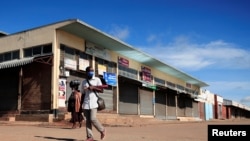Zimbabwe’s government is asking for help from the country’s corporate sector, citizens and other well-wishers to fund the import of COVID-19 vaccines. The southern African nation is falling behind in the battle with the coronavirus, despite imposing a 12-hour curfew last month as part of a lockdown to deal with the pandemic, which has infected about 35,000 people in Zimbabwe and caused 1,300 deaths, most of them this year alone.
Itai Rusike, executive director of the nonprofit Community Working Group on Health in Zimbabwe said in an interview he was shocked by the extension of the “usual begging bowl” when President Emmerson Mnangagwa’s government has been lately “bragging of a surplus budget.” He said citizens and companies in Zimbabwe are feeling the impact of the slowed economy, so they cannot donate for COVID-19 vaccine imports.
"So, let us use the budget surplus money to purchase the vaccines. We also have the 2% tax on mobile money transactions," said Rusike. "We also have the health levy. These funds should be earmarked for the vaccine purchases for now. Even the International Monetary Fund said spend the budget surplus money as long as the financing is transparent and closely monitored.”
Zimbabwean Finance and Economic Development Minister Mthuli Ncube refused to comment Saturday on his call for assistance.
Rusike added that the call for an unspecified amount of funds to import vaccines was confusing after Mnangagwa this week said his government had sourced free vaccines – some 200,000 donated by China. In the same speech, broadcast on national television, Mnangagwa said.
“A national vaccine deployment framework has also been finalized," he added. "The initial objective is to inoculate at least 60% of the population. Government has set aside the requisite financial resources for the purchase of vaccines.”
Rusike said Zimbabwe should not expect much assistance from its usual donors such as the U.S., Britain and the European Union.
"It will be very difficult for the international donors, to come in and support Zimbabwe at this stage," said Rusike. "Mainly because the very same donors are having the biggest burden of COVID-19. If you look at the U.S, the U.K, these are the hotspots for COVID-19. A lot of more people [than Zimbabwe] have been infected from COVID-19 and a lot of people continue to die from COVID-19 in those respective countries.”
For years now, the country’s health sector has largely depended on assistance of aid organizations such as USAID. The country’s health workers have on several occasions been on strike – including during this coronavirus outbreak - asking for PPE and better salaries.







